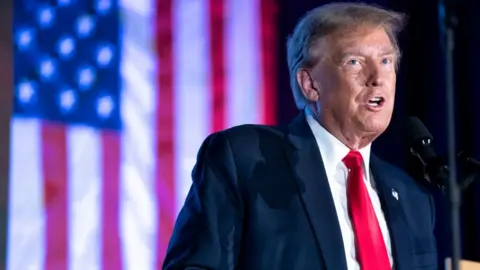By Madeline Halpert and Anthony ZurcherBBC News
 Getty Images
Getty Images
The Supreme Court will decide if ex-President Donald Trump is immune from being prosecuted on charges of trying to overturn the 2020 election.
The 6-3 conservative majority court decided on Wednesday to hear Mr Trump's claims that he should be shielded from criminal liability.
The ruling marks the first time the court has weighed in on such a case.
A US Court of Appeals panel has already rejected Mr Trump's argument that he enjoys presidential immunity.
Mr Trump had claimed in the landmark legal case that he was immune from all criminal charges for acts he said fell within his duties as president.
But the appeals court ruled unanimously against the 77-year-old, writing that: "We cannot accept former President Trump's claim that a president has unbounded authority to commit crimes that would neutralise the most fundamental check on executive power - the recognition and implementation of election results."
He appealed the case to the Supreme Court and asked to put that decision on hold.
On his Truth Social site, Mr Trump welcomed Wednesday's decision and contended that without immunity "Presidents will always be concerned, and even paralyzed, by the prospect of wrongful prosecution and retaliation after they leave office".
"This could actually lead to the extortion and blackmail of a President," he wrote.
Mr Trump was charged last year with witness tampering and conspiracy to defraud the US in federal court in Washington DC over his attempts to overturn his 2020 election loss to Joe Biden.
Jack Smith, who was appointed as special counsel in the investigation, brought the charges against Mr Trump, and pushed for the trial to be held this year.
The court could have let the appellate court judgement stand, which would have allowed the trial proceedings to resume.
Instead, a minimum of four of the nine justices voted to take up the case. That suggests that there is some debate within the court on whether Mr Trump has some immunity from prosecution.
The decision has the potential to seriously delay the trial, which was originally scheduled for March.
Arguments in the Supreme Court case are scheduled for the week of 22 April, and any trial will have to wait until after a decision is made.
Although a decision could come swiftly, the justices could rule that the former president is immune from prosecution, or issue a decision that further delays legal action.
Justice Department guidelines limit prosecutorial action in politically sensitive investigations from within 60 days of an election - meaning prosecutors face a deadline of early September.
And if Mr Trump wins in November, there is a growing possibility that the case never reaches trial. His Justice Department officials could drop or indefinitely suspend the special counsel investigation or he could take the unprecedented step of issuing a pardon for himself.
The Republican front-runner candidate for president is facing a host of other federal and state criminal charges.
The former president is facing a trial starting in late March on charges of falsifying business records over hush-money payment he made to a porn star.
The Supreme Court is also hearing arguments in a separate case weighing whether Mr Trump can be disqualified from running for a second term under the 14th Amendment's "insurrection ban."
Mr Trump has pleaded not guilty in all the cases, frequently referring to them as political "witch hunts".